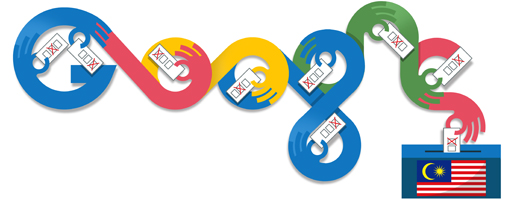Election fever! Google honours Malaysia's 13th General Election with the creation of Election Doodle for Malaysia Google Home Page at www.google.com.my I've done my part casting my vote for the first time ever. For your information, Malaysians can vote when we reach the age of 20. In the last General Election, I was not able to vote because I was still studying overseas and I did not register to vote from overseas. Anyway, I'm glad I did my part as a Malaysian today.
Back to the real task. I'm already done with Week 5. This is by far the most busy week for me. It is also the most fruitful week as I did and learnt a lot this week. The topic seems easy - Assessment, Rubrics and Project-based Learning. I did one entire semester of assessment paper when I was in university but there are many new things introduced to me this week.
Firstly, alternative assessment. Reading about it on Assessing Learning: Alternative Assessment, it becomes clear to me that our Malaysian education system is moving towards it. Ministry of Education has just introduced the school-based assessment last year so this is the second year we are doing such assessment. The Form 1 and Form 2 students now do not have to sit for any national examination. Instead, they are assessed based on performance tasks as explained on the website. It follows all the features of alternative assessment, agrees to the criteria that defines authentic assessment activities etc. To me, alternative assessment is an excellent model to assess students. There's only one downside of it - it requires a lot of teachers' time and effort. Yes marking examination script may be a suffering for us but checking students' work over and over again (especially when they repeat and repeat a certain task because we think that their performance is not up to the standard) is even more tiring.
Secondly, I learnt 2 valuable tools for teachers i.e. Rubistar and Webquest. Rubistar is a website where teachers can create rubrics for students and teachers' use. As Robert mentioned in the class website,
"...Rubrics are a wonderful way to clarify expectations for holistic grading, such as for writing or speaking. The rubric becomes a kind of contract between the teacher and the learners, so that learners know that if they do the things associated with "excellent" in the rubric, they will get an "excellent" mark. Students are more motivated, and assessment is easier. Students must get the rubrics when they begin the task."
Webquests, on the other hand, are a form of PBL. It is "...an inquiry-oriented activity that uses resources on the World Wide Web" and "...help[s] students develop problem-solving and decision-making skills." (Professor Bernie Dodge of San Diego State University). Students surf on one WebQuest, go to websites the teacher has listed and do tasks required using the processes mentioned on the WebQuest. The task can be done individually or in groups, according to what's instructed. A WebQuest usually has a specific structure; Welcome, Introduction, Task, Process, Evaluation, Conclusion and Teacher's Page. I've created mine as well using Zunal - Zunal WebQuest: Fun With Idioms. Do visit!

After rereading and rethinking last week's problem, I've finally figured out one possible solution. Before we proceed, let me recap of what my problem is. My students are very much focused on the upcoming national examination that they are going to sit for at the end of this year. Yes, they are interested in a technology-enhanced lesson but they could not relate (or able to but very little) the use of Internet and examination. They always think that whenever they use the Internet in class, it's only for fun but not to prepare them for the examination. I found the root of this problem. I could still use the Internet and technology-enhanced lesson plans but I need to always give them the rubrics, show them the relations between the activity they're doing and how does that help them prepare for their examination. For example, the Fun With Idioms WebQuest I created can be used to prepare them for English 1119 Paper 1 where they can include idioms to produce a better essay and for English 1119 Paper 2, they should know idioms to be able to answer some multiple questions involving the figurative meaning of idioms. I suppose by clearly making this link, they'll be clearer in where they're heading to.
I think I've put in a lot of thoughts in this blog entry. Looking forward to read others too. :)

Hi Zahirah,
ReplyDeleteI like your post. It's well written. After reading your problem, I think we have similar problems. I do believe your strategy will work. I have notice that the lack of rubric may have been the cause of one problem with a former project with my students. So integrating a rubric will definitely help build ties between their learning, performance,and the tasks.
Keep doing the good job.
HI Zahirah,
ReplyDeleteI've read your post for week 5. I totally agree with you on showing the relation of the activity they are doing now and how it'll help them in their final exams.As it mentioned in week 5 rubrics like a contract between the teacher and the learners, so that learners know that if they do the things associated with "excellent" in the rubric, they will get an "excellent" mark. I also found rubrics so useful and want to try them in my lessons.
Saodat
Hi Abdouse and Saodat,
ReplyDeleteThanks for your comments. Let's keep on sharing good things in the e-class. :)
Zahirah